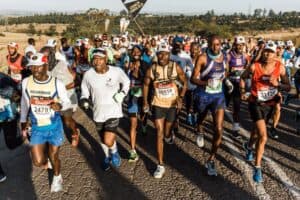Daniel de Wet dedicates his race to trauma surgeon, hospital team and rescue workers.

When Daniel de Wet regained consciousness in Netcare Milpark Hospital after a 1.8-metre metal industrial crowbar penetrated his body 3.5 kilometres underground at a mine in Carletonville, he never imagined that he would now be making final preparations for taking part in his first Comrades Marathon since the accident.
“Just three-and-a-half years ago, my wife and colleagues were praying for my survival, and when I was able to walk out of the hospital only 19 days later, we regarded it as a miracle from God. To think that I have now successfully qualified to take on the Comrades Marathon once more is truly remarkable, and every day I am so grateful for the recovery I have made,” De Wet says.
“Day by day, I have regained my strength, and this year I have managed to qualify for the 2018 Comrades Marathon. I am dedicating my run to every single rescue worker, paramedic, firefighter, and especially to Netcare 911, Netcare Milpark Hospital and trauma surgeon Professor Kenneth Boffard.”
“Before my accident in 2015, I ran the Comrades Marathon six times, and during my initial recovery after the accident, it seemed to me that I would never be able to take part in this gruelling ultramarathon ever again,” De Wet notes.
On 10 June, however, he will be taking on the challenge of this year’s Comrades Marathon with his running club, the Carleton Harriers, wearing race number 49470.
An unusual injury
One afternoon in January 2015, engineering supervisor De Wet was working on washing out a dam 3.5km underground at a mine in Carletonville, using an extended crowbar to stir up the mud, when he suddenly slipped. De Wet looked down and, to his utter disbelief, saw that the metal bar had penetrated his body, entering his groin area and coming out of his back, just below his shoulder blade.
He recalls how the mine’s rescue team had to carry him perched awkwardly in a sitting position on a stretcher, as the metal bar protruding from his body was almost level with De Wet’s feet, making it impossible for him lie down.
“I was talking the whole time, trying to keep the other guys calm,” he remembers. Having been brought up to surface level at a pace that would ensure that he did not suffer any adverse decompression effects, commonly known as ‘the bends’, he was airlifted to Netcare Milpark Hospital’s world-class, level-one trauma centre by an experienced team of Netcare 911 paramedics.
When he arrived two surgical teams, led by renowned trauma surgeons, Professor Boffard and Professor Elias Degiannis, were ready to operate: one team concentrating on his injuries in the abdomen and one on those in the chest area.
Once the extended crowbar was pulled completely free of De Wet’s body, the doctors saw that the impalement had caused significant damage, destroying one kidney and damaging his small bowel and numerous blood vessels. Although De Wet lost a kidney, he made rapid progress and was discharged from hospital just 19 days later.
As a token of his appreciation, De Wet presented the 1.8-metre metal rod that was removed from his body as a gift to Professor Boffard and Netcare Milpark Hospital.
Support Local Journalism
Add The Citizen as a Preferred Source on Google and follow us on Google News to see more of our trusted reporting in Google News and Top Stories.






